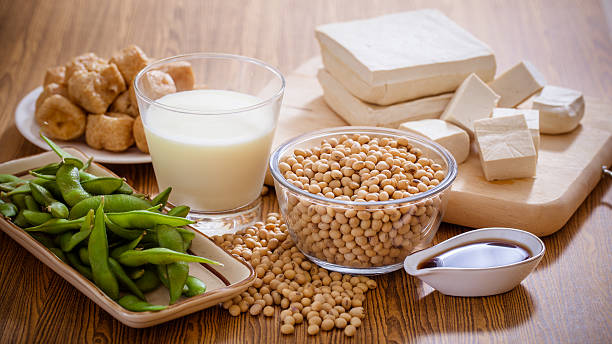

Are you a fan of plant-based diets? To boost your well-being, you might want to try soy products. Laden with fiber, protein, and vital minerals, soy is a super addition to a plant-based diet. It is an alternative to primarily animal-based products, imparting nutritional blessings, heart and bone fitness benefits, and cholesterol-lowering advantages.
Are you looking for a robust plant-based protein that is packed with nutrients? Look no further than soy. Asian people have enjoyed soy as a staple for hundreds of years. It is extensively enjoyed worldwide through tofu, tempeh, soy milk, and meat options. This plant-based protein source has become increasingly famous as extra people turn to plant-primarily based diets for health, moral, and environmental reasons.
As more people flip to plant-based diets, soy has become famous in vegan and vegetarian dishes. Luckily, incorporating it into your food plan is convenient. This article explores the position of soy in plant-based diets, consisting of its dietary advantages, coronary heart and bone health benefits, and methods to include soy in your meals.
Table of Contents
There is a good chance that you have consumed soy protein in the recent past if you are a vegetarian. Diets focusing primarily on plants have gained popularity in recent years due to their ability to improve health and reduce environmental impact. Diets like these often involve consuming foods derived from plants, such as vegetables, grains, legumes, nuts, and seeds, while reducing or eliminating animal consumption.
You may consume innovative soy products in various forms, such as soybeans, tofu, tempeh, soy milk, and soy protein powder, and it has been a standard component of the diet in several nations in Asia for hundreds of years.
Plant-based diets have been shown to have several health benefits, including a reduction in the chance of developing chronic illnesses, including coronary heart disease, diabetes, and cancer, as well as some other advantages. And you can take advantage of these benefits by including foods made with soy in your diet.
You need protein to construct and repair tissues in your body and generate enzymes and hormones. While animal-based by-products are a conventional supply of protein, they have excess saturated fat and LDL cholesterol, which might be potential risk factors for coronary heart sicknesses. With that in mind, you can turn to soy protein as an alternative to animal-based proteins. Soy is low in saturated fat and LDL cholesterol, making it a heart-friendly supply of protein.
You can get soy protein by eating soybeans, tofu, tempeh, and soy protein isolate; that’s a well-known aspect in plenty of vegan protein powders. In reality, soy protein is one of the few plants that give you all the nine critical amino acids your body cannot synthesize de novo. It could be your go-to option if you’re allergic to dairy or other animal-based proteins.
Studies have shown that soy protein may be as adequate as animal protein in constructing muscle mass and enhancing body composition.
In addition to giving you a good supply of protein, soy also confers several health advantages. One of the essential aspects in which soy is helpful for your well-being is its potential to decrease levels of cholesterol, in particular LDL cholesterol levels. From soybeans, you may get isoflavones that have been validated to lessen LDL cholesterol levels and boom HDL stages which may assist in lowering the threat of heart problems.
Phytoestrogens, found in soy, can imitate the effects of estrogen, which is essential for preserving bone density. As a woman, eating soy isoflavones gives you a greater chance of having better bone mineral density than other women who do not consume soy. This advantage does not apply to men. Therefore, consuming foods made from soy can help improve your cardiovascular and bone health if you include them in your diet.
Incorporating soy into your everyday meals can be smooth and delicious. The are many ways to use soy foods in your favorite recipes. Here are a few ideas for including soy in your meals:
You can benefit hugely by including soy in your plant-based diet plan, which is wealthy in protein, fiber, nutrients, and minerals and low in saturated fat. It can help improve your heart and bone health and decrease cholesterol. However, choosing whole soy products and consuming them with care is crucial.
Nevertheless, you should communicate with your health practitioner before considering a soy plant-based diet. Go ahead and embrace soy in your day-by-day meals; it is a critical aspect of wholesome plant-based diets. Moreover, it is an excellent option to try something new or focus on your health.
Sign up to receive our email, delivering the latest stories straight to your inbox.
